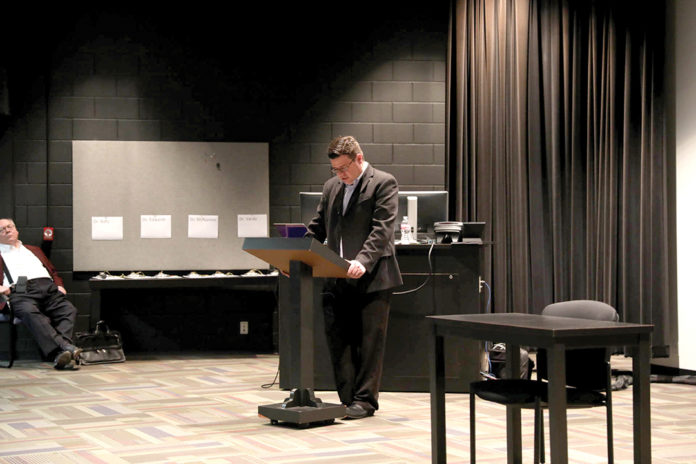
Dr. Paul Stob came to Castellaw Communications Center to present “Black Hands Push Back: Reclaiming the Rhetoric of Booker T. Washington” on Wednesday.
Stob is an associate professor of communication studies at Vanderbilt University. Dr. Martin Medhurst, distinguished professor of rhetoric and communication and professor of political science at Baylor, introduced Stob at the beginning of the lecture.
“Anyone interested in America’s history of racial segregation and the post-Reconstruction world learned a lot from Dr. Stob’s lecture. He is one of our nation’s leading scholars of the progressive era,” Medhurst said. “He set forth a unique interpretation of one of the most important speeches in American history. He also gave us lots to think about regarding the relationship between symbols and cultural understanding.”
When asked why chose this topic to study, Stob explained that he really wanted to let people know and understand what Washington said.
“Booker T. Washington is a really famous figure in American history, but I don’t think people correctly understood him very well,” Stob said. “He is the kind of person who somebody didn’t take time reading and studying very carefully. To understand the terms from Washington, that is my main goal.”
Stob gave the lecture because he wanted people to understand figures like Washington who spoke to particular audiences such as African-Americans in the South. Washington really tried to understand the language that African-Americans were using, Stob said.
“Washington spoke a lot about the hands and the power of human hands to connect with other people, to reach out and embrace other people, to push, pull and grab with other people,” Stob said. “I think it was an effective way to reach audiences like African Americans in the South, other people didn’t do that at that moment.”
Stob emphasized that in the South, black hands could push freedom and justice to the destiny of race.
“In the progressive era, Washington called for a chance for black people to reshape their lives, and it could become an agent for the American society,” Stob said. “Busy hands come to represent African Americans as labors but notice that labors are creating their own worlds, food supplies, comfort and homes.”
Stob also mentioned education could be an important factor to black people to lift up their lives, and Washington could just imply work hands with animation instead of mentioning black hands.
“For instance, Washington praised the national negro business and its effort to hold up before the race disadvantaged. He insists that the function of education was to teach the race and lift itself up out of the judger,” Stob said. “Similarly, he called for education to every black youth.”
In order to help audiences understand what Washington tried to express, Stob provided a website link for anyone who has additional interest to read about this topic.





